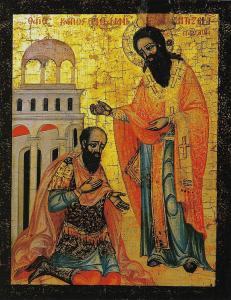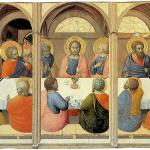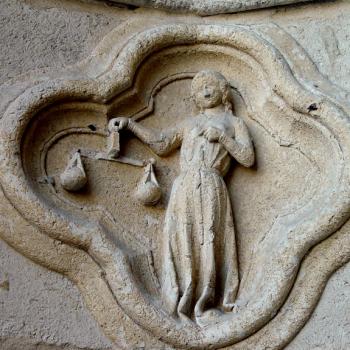
Paul, talking about his apostolic authority, indicated two important things. The first is that those who are given such authority are given it by God. The second is that such authority is not to be used selfishly, for personal gain, but rather, is given so that those who have it have what they need to work for the benefit of others instead of lording it over them:
But it is God who establishes us with you in Christ, and has commissioned us; he has put his seal upon us and given us his Spirit in our hearts as a guarantee. But I call God to witness against me — it was to spare you that I refrained from coming to Corinth. Not that we lord it over your faith; we work with you for your joy, for you stand firm in your faith (2 Cor. 1:21-24 RSV).
Paul worked, and worked hard, to bring Christ’s peace and joy to fellow Christians, and of course, not just to them, but to everyone he met. He hope everyone would be able to partake of God’s peace and grace. He even said he would willingly suffer perdition if it meant others would be saved, showing that he moved beyond a selfish approach to salvation, seeking it only for himself, to one which looks for and hopes for the salvation of others. Even when he was not a Christian, this likely was an aspect of his faith, but, due to his ignorance, it motivated him to fight against Christianity, and act in ways which ultimately undermined the very love which he fought to protect and preserve. That is, he did what he did out of a love for God, and through it, even a love for others, wanting people to know and follow the truth, but the problem is, he did not know the truth, and so his ignorance led him to act against the way of love. It was because he had such love, however perverted it was, Paul was able to be converted and find his love become better after he encountered the resurrected Christ. It can also be suggested that it was because of this love God commissioned Paul to his evangelical ministry, granting him apostolic authority, for God knew that once Paul was transformed in Christ, he would not use authority for his selfish desires but rather use it to promote God’s universal love in the world. This is not to say Paul was perfect, for he was not, and Paul himself knew that he could be end up abusing the authority given to him – he knew the temptation, and it was in part, because of that temptation, he kept himself from making another visit to the Corinthian community:
For I made up my mind not to make you another painful visit. For if I cause you pain, who is there to make me glad but the one whom I have pained? And I wrote as I did, so that when I came I might not suffer pain from those who should have made me rejoice, for I felt sure of all of you, that my joy would be the joy of you all. For I wrote you out of much affliction and anguish of heart and with many tears, not to cause you pain but to let you know the abundant love that I have for you (2 Cor. 2:1-4 RSV).
Paul recognized his human side, his human emotions and how those emotions could cause him to end up abusing his authority in order to deal with some of the disappointing things he saw coming from the Corinthian community. He knew that if he visited them that temptation would have been greater, and as such, he would likely have done something which would have wounded their faith. He did not want to be further pained by them, but also, he did not want to be a cause for their spiritual pain and sorrow. He loved them, and wanted that love to be as pure as possible.
Certainly, what Paul said and did here showed that he understood what Christ wanted of him. Indeed, during his earthly ministry, Christ has made it clear, those with positions of power and authority must not lord it over others, but rather, they must use whatever authority they have to better serve others. If only more Christians in positions of authority and power held the same view, for then, Christians would truly prove to be the salt of the earth. But, as all Christians have been given some authority, thanks to their incorporation into the body of Christ, and the gift of the Holy Spirit, all of us must view Christ’s words (and Paul’s example of how to live them out) are meant for all. When we go out into the world to announce the good news, we should share God’s love with others, not lord it over them, even if it means we find ourselves repudiated, attacked, or even killed:
And again Jesus spoke to them in parables, saying, “The kingdom of heaven may be compared to a king who gave a marriage feast for his son, and sent his servants to call those who were invited to the marriage feast; but they would not come. Again he sent other servants, saying, `Tell those who are invited, Behold, I have made ready my dinner, my oxen and my fat calves are killed, and everything is ready; come to the marriage feast.’ But they made light of it and went off, one to his farm, another to his business, while the rest seized his servants, treated them shamefully, and killed them (Matt. 22:1-6 RSV).
Those who would serve Christ must remember that it is Christ, not themselves, they serve; of course, everyone is human, everyone has their own issues to deal with – Paul himself was able to acknowledge that – but those who seek to serve God should truly do what they can to cast aside their personal preferences, their own biases, so that they can truly inspire others by the way they follow Christ. For, once they have cast aside their selfishness, and every attempt to lord it over others, their love will be made that much more clear, and that love will be very appealing to others.
Stay in touch! Like A Little Bit of Nothing on Facebook.
If you liked what you read, please consider sharing it with your friends and family!
N.B.: While I read comments to moderate them, I rarely respond to them. If I don’t respond to your comment directly, don’t assume I am unthankful for it. I appreciate it. But I want readers to feel free to ask questions, and hopefully, dialogue with each other. I have shared what I wanted to say, though some responses will get a brief reply by me, or, if I find it interesting and something I can engage fully, as the foundation for another post. I have had many posts inspired or improved upon thanks to my readers.












